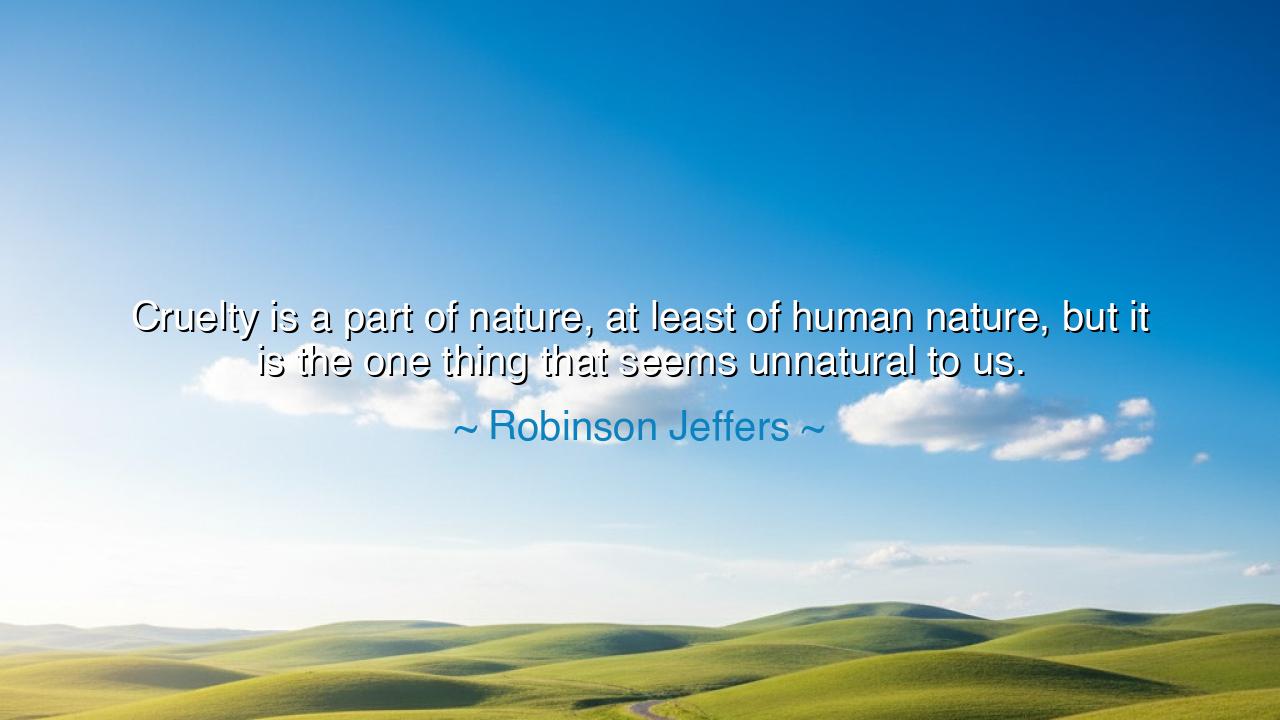
Cruelty is a part of nature, at least of human nature, but it is
Cruelty is a part of nature, at least of human nature, but it is the one thing that seems unnatural to us.






Hear the solemn voice of Robinson Jeffers, poet of stone and sea, who declared: “Cruelty is a part of nature, at least of human nature, but it is the one thing that seems unnatural to us.” In these words lies a paradox both haunting and true. For though violence and cruelty flow through the history of mankind like blood through veins, still the human heart recoils, as though such acts were foreign to its deepest essence. It is as if we were torn between two selves: the beast that strikes and the spirit that mourns.
To call cruelty “a part of nature” is to recognize the hard law of survival that governs all living things. The hawk takes the dove, the wolf rends the lamb, and death stalks every meadow. Man, too, inherits this law, driven by instincts of power, fear, and desire. Wars are waged, injustices inflicted, and violence poured out upon the weak. This is the dark inheritance of human nature. Yet, Jeffers reminds us, something within us resists. Unlike the hawk or wolf, we look upon cruelty with horror, as though it were alien, as though it violated a deeper law inscribed upon the soul.
This paradox reveals the greatness and tragedy of man. For we are both participants in nature’s struggle and rebels against it. We kill, yet we mourn killing; we harm, yet we know harm to be wrong. In this tension lies the mark of our dual being—creatures of earth bound by instinct, yet also seekers of the eternal, who feel within themselves the call to mercy, justice, and love. To Jeffers, the very fact that cruelty feels unnatural is proof of our higher calling, a whisper of something beyond brute existence.
History bears witness to this struggle. Consider the tale of Ashoka the Great, the warrior-king of India. After the bloody conquest of Kalinga, where thousands perished, he was seized not with triumph but with horror. The cruelty he had unleashed seemed suddenly unbearable, and from that moment he turned to the teachings of the Buddha, embracing peace and compassion. His empire, once built by the sword, became a beacon of tolerance and mercy. Here we see Jeffers’ truth: cruelty is within us, yet the soul recoils, and in that recoil lies the birth of transformation.
And yet, how often do we forget? Nations glorify war, individuals harden themselves to the suffering of others, and cruelty is excused as necessity. But Jeffers calls us to honesty: cruelty may be part of human nature, yet it will never feel at home in the conscience of man. It is a poison we drink, but never without bitterness. To ignore that bitterness is to descend into the coldness of the beast. To heed it is to awaken to the nobility of our spirit.
The lesson here is clear: acknowledge the presence of cruelty within the world and within yourself, but do not accept it as destiny. The revulsion you feel at suffering is not weakness; it is wisdom. It is the sign that your spirit longs for harmony beyond the laws of tooth and claw. Do not suppress this voice, but follow it, for it is the guide that leads from barbarism to compassion, from instinct to virtue.
Practical steps may follow: resist cruelty wherever you see it, whether in great injustices or in small daily acts. Speak for those who cannot speak, shield those who cannot shield themselves. Begin within: tame the anger that lashes out, the pride that belittles, the apathy that ignores another’s pain. In doing so, you align yourself with the higher law—the law that knows cruelty is real, but refuses to let it rule.
Remember always: cruelty may dwell in human nature, but it is never truly natural to the soul. The hawk kills without remorse, but man feels the wound twice—once in the victim, and once in his own conscience. This is both our burden and our hope: we are torn between earth and heaven. Let us choose heaven, and in doing so, redeem the nature that gave us birth.






AAdministratorAdministrator
Welcome, honored guests. Please leave a comment, we will respond soon